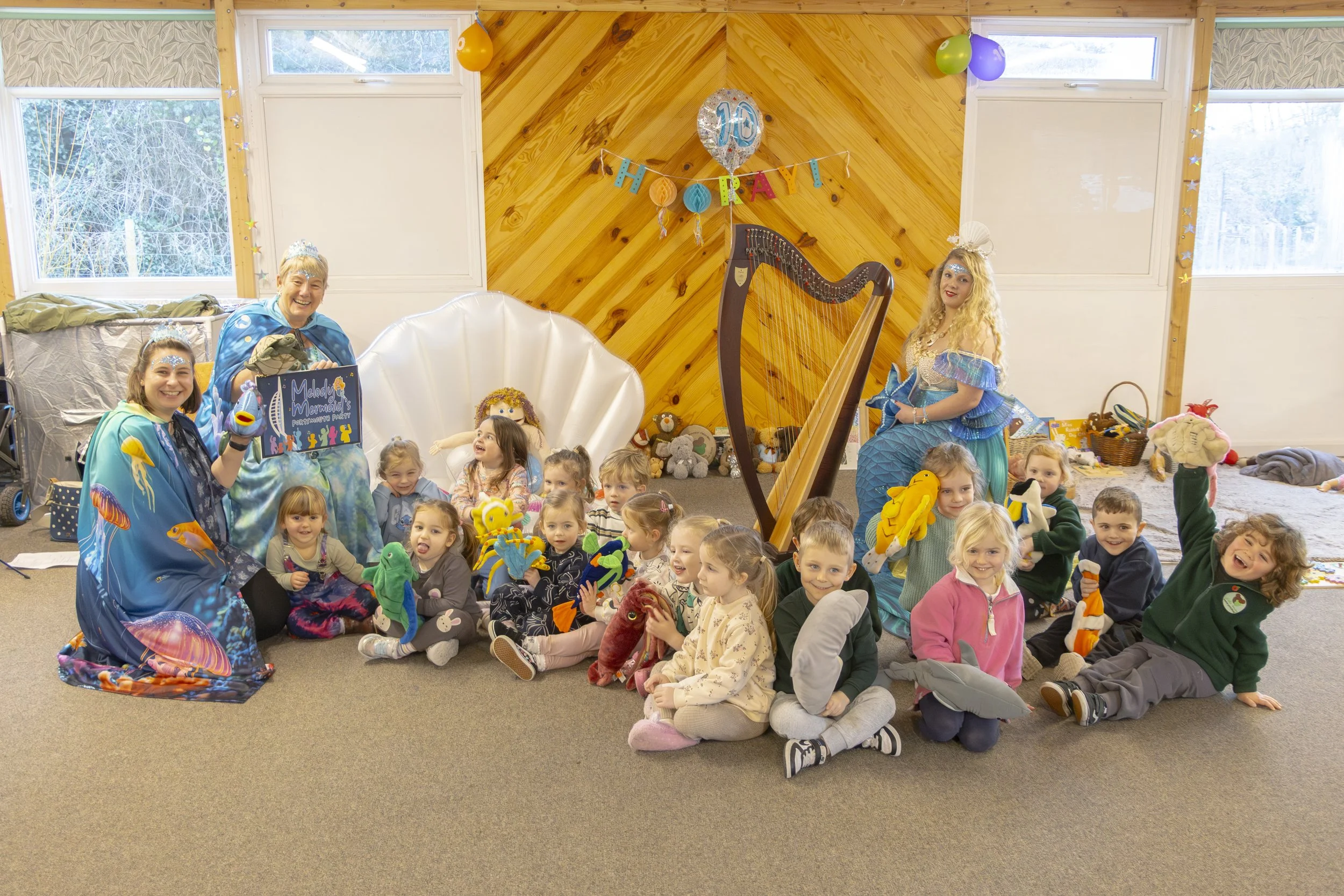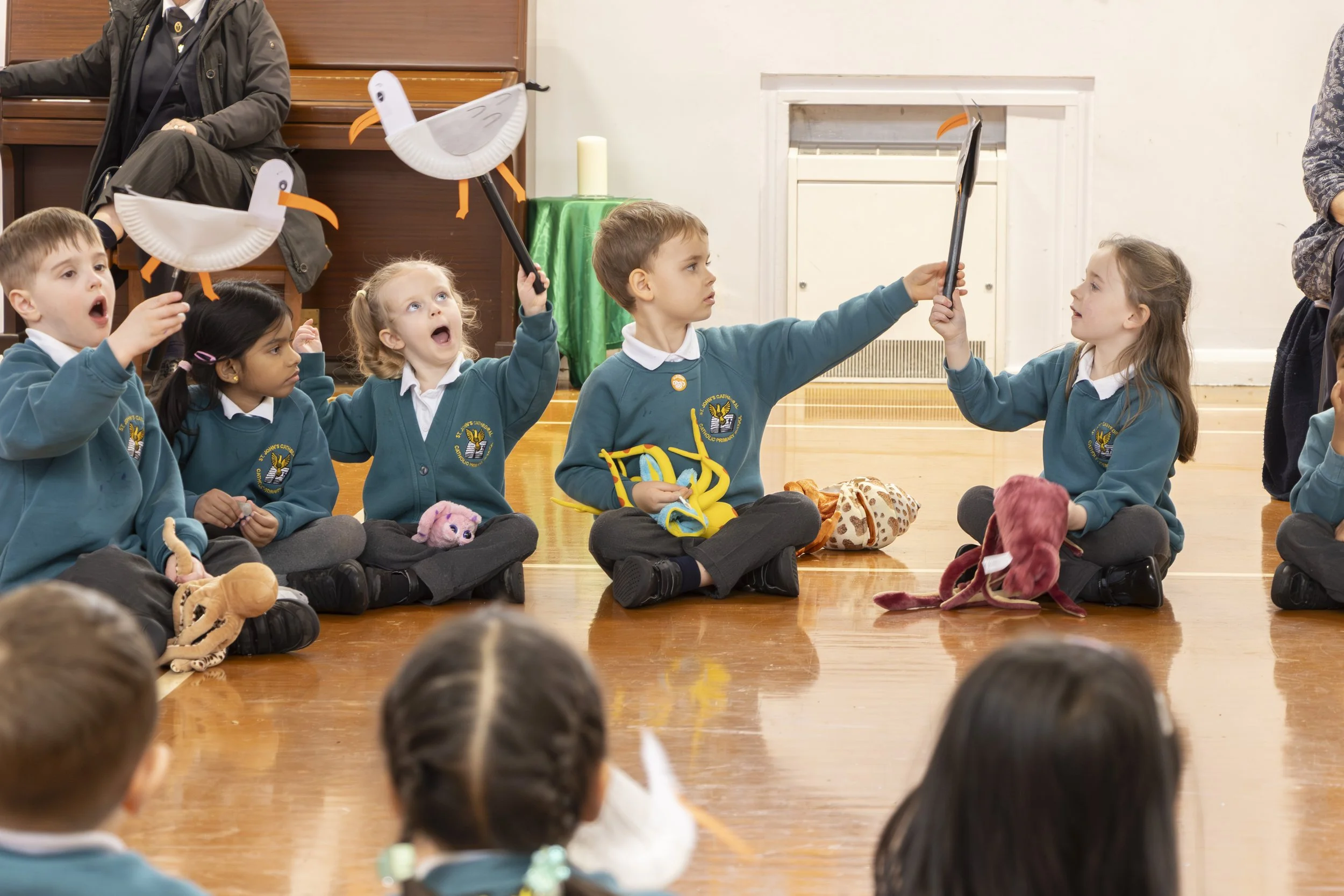
News
Melody Mermaid Makes Waves at Portsmouth Early Years Workshops
Children across Portsmouth have been diving into a world of underwater music and imaginative play thanks to Melody Mermaid’s party workshops, delivered by Portsmouth Music Service.
In these magical early years sessions, Melody and her sea friends set off on a musical adventure to find the perfect gift for the Lord Mayor of Portsmouth’s party. Through songs, movement, storytelling and sound exploration, children were encouraged to express themselves, build confidence, and engage creatively with music in a playful, immersive environment.
The workshops were made even more special when the Lord Mayor himself visited one of the sessions, delighting children and staff alike and bringing an extra sparkle to the underwater story.
A special thank you goes to Amy the Harp Lady, whose beautiful harp playing added an enchanting layer to the experience and helped bring Melody’s ocean world to life.
These workshops highlight Portsmouth Music Service’s commitment to providing inspiring, high-quality musical opportunities for young children, nurturing creativity from the very start.
All the resources to the workshops can be found on Portsmouth Music Hub’s website, follow the link below -
https://www.portsmouthmusichub.org/melody-mermaids-portsmouth-party
Follow the link below for photos from the workshops - https://www.portsmouthmusichub.org/melody-mermaid
Portsmouth Pupils Shine in Festive Christmas Jumper Video Supporting Save the Children
Over 2,500 children from 16 schools across Portsmouth have come together to spread festive cheer and support Save the Children’s Christmas Jumper Day in a vibrant new video celebrating community, creativity, and charity.
The video showcases young performers proudly wearing their brightest, boldest, and most imaginative Christmas jumpers, all in aid of raising awareness for Save the Children’s annual fundraising event, which helps support vulnerable children in the UK and around the world.
Starring young singers from:
Ark Dickens Primary Academy
King's Academy College Park
King’s Academy Northern Parade
Cottage Grove Primary School and Nursery
Langstone Primary Academy
Manor Infant and Nursery School
Mary Rose Academy
Milton Park Primary School
Penbridge School
Portsdown Primary School & Early Years
Solent Junior School
Southsea Infant School
St John's Cathedral Catholic Primary School
St Jude's C of E Primary School
St Paul's Catholic Primary School
Westover Primary School
Together, these schools have created a heartwarming celebration of Portsmouth’s young talent, showcasing the strength of the city’s school communities and their commitment to making a positive difference.
Save the Children’s Christmas Jumper Day encourages people across the country to don a festive knit and donate to support children facing challenges such as conflict, poverty, and lack of access to education.
To learn more about Christmas Jumper Day or to donate, https://donate.justgiving.com/fundraising/cjd250033951/donation-amount
Portsmouth Pupils Celebrate Paulsgrove with New Collaborative Song and Film
Pupils from St Paul’s Catholic Primary, Beacon View Primary Academy and The Victory Primary School have come together to celebrate their community through a brand-new song inspired by Seekers Create’s latest mural in Paulsgrove.
The song captures both the rich history and the vibrant present of Paulsgrove, from post-war beginnings and the long-lost racecourse to the area’s modern landmarks, retail developments and thriving community spaces including its churches, schools and library. Through lyrics that journey from Allaway Avenue to Port Solent, up to the Chalk Pits and Portsdown Hill, the children proudly sing of the place they call home: “We’re Pompey’s hidden gem… No longer a secret, we’re rising again!”
“It has been wonderful to see the children respond so passionately to the creative spirit of their community. The song and film celebrate everything that makes Paulsgrove such a vibrant place to grow up, and we are incredibly proud of the pupils for bringing it to life with such joy and energy.”
Sue Beckett, CEO of Portsmouth Music Hub
This project has been made possible thanks to funding from Arts Council England, whose support enabled both the creation of the song and the digital collaboration between the schools and creative partners.
Pilgrims of Hope: Portsmouth Schools Unite in Song for the Jubilee Year 2025
In 2025, Pope Francis had called the Church to celebrate a Holy Year of Jubilee, a moment of renewal, hope, and joy that only comes once every 25 years.
To mark this special occasion, Portsmouth Music Hub has joined forces with St John’s Catholic Cathedral, the Catholic Diocese of Portsmouth, and four Catholic primary schools across the city to create Pilgrims of Hope, a brand new song composed especially for the Jubilee Year.
The project brings together young voices from across Portsmouth, celebrating the themes of faith, unity, and community that lie at the heart of the Jubilee.
The song features children from:
· Corpus Christi Catholic Primary School
· St John’s Cathedral Catholic Primary School
· St Paul’s Catholic Primary School and Nursery
· St Swithun’s Catholic Primary School
Over 280 Young Brass Players Unite at Portsmouth Guildhall
Portsmouth Music Hub proudly hosted its spectacular Top Brass concert at Portsmouth Guildhall, with more than 280 young brass instrumentalists coming together for a vibrant day of music-making.
The young musicians were joined by the energetic and internationally acclaimed Bollywood Brass Band, alongside Portsmouth Music Hub’s very own brass scratch band, made up of talented local brass players from the Band and Bugles of The Rifles, Portsmouth Citadel Salvation Army Band, Portsmouth City Brass, Ark Charter School, and staff from Portsmouth Music Hub.
Thanks to generous funding from the Hornpipe Grants Scheme, this year long project has brought brass instruments into schools across the city, enabling students to learn and develop their skills throughout the year.
The day culminated in a high-energy interactive concert, where students performed side by side with professional musicians in a celebration of brass music. Families were invited to enjoy the final concert, which concluded with a performance of the event’s very own anthem, “Brass! You Can Do It!”
“Top Brass has been an incredible journey for these young musicians. Thanks to the Hornpipe Grants Scheme, hundreds of children have had the chance to pick up a brass instrument, build confidence and experience the joy of performing live on a professional stage.” - Sue Beckett, CEO of Portsmouth Music Hub
Portsmouth Music Hub remains committed to creating inspiring musical opportunities for children and young people across the city.
Has your child been learning a brass instrument and wants to keep playing with others? Follow the link below to find out how they can get involved!
Young Change Makers Take Centre Stage at the New Theatre Royal
Last week, the New Theatre Royal was filled with music, creativity and a powerful message of change as Portsmouth Music Hub proudly presented the Change Maker Showcase.
Pupils from St Paul’s Catholic Primary, Wimborne Primary School, Langstone Primary Academy and Highbury Primary took to the stage to perform a series of brand-new songs, each written to inspire social change and celebrate the voices of a new generation of change makers.
The evening was a vibrant celebration of music, art and creativity. A culmination of weeks of collaboration between schools and creative partners Ricky Tart Music, Seekers Create and brilliant songwriter Emily Barden. Together, they helped young people explore important themes and express their ideas through original performance.
The showcase highlighted the power of the arts to spark conversation, build confidence and empower young voices. Portsmouth Music Hub is proud to support projects like this that place creativity at the heart of learning and community.
All the songs are freely available on Portsmouth Music Hub’s online song bank ‘Song Source’.
https://www.portsmouthmusichub.org/985463
Young Voices Ring Out Across Portsmouth Historic Dockyard
Portsmouth Historic Dockyard was alive with music and youthful energy last Friday, 13 June, as over 220 young singers from across Portsmouth and Southampton came together in beautiful sunshine for the spectacular Sing Around The Dockyard event.
Pupils from St Paul’s Catholic Primary, Redwood Park Academy, St. Patrick’s Catholic Primary School, St George’s Beneficial Church of England Primary School, Copnor Primary School, and St. John’s Cathedral Catholic Primary School took part in a unique musical journey through one of the UK’s most treasured historic sites.
The event invited pupils to embark on an exciting adventure through the iconic Dockyard, exploring legendary ships and immersing themselves in the rich maritime heritage of Portsmouth. As they travelled between landmarks, the children performed lively sea shanties and songs inspired by Portsmouth’s proud naval traditions and the sea, filling the historic air with the sound of young voices and infectious enthusiasm.
Performances were held at landmark locations across the Dockyard, including the world famous Mary Rose Museum and the top deck of HMS Warrior. These performances offered students a once-in-a-lifetime opportunity to make music in the heart of Portsmouth’s naval story.
A particular highlight of the day was a special performance by the internationally renowned Royal Marines School of Music, which left young performers and audiences alike thoroughly inspired.
Portsmouth Schools to unite in song to mark 80 years since VE Day
After Easter, ten schools from across Portsmouth will come together to begin filming a very special music video to mark 80 years since VE Day. The project will bring young voices from across the city to the forefront in a heartfelt musical tribute to this historic moment of peace and celebration.
The song, composed especially for the occasion by Iain Gilmour, captures the joy and relief felt at the end of the Second World War. With uplifting lyrics and a powerful melody, the piece reminds us of the importance of hope, unity, and resilience through the eyes of a new generation.
“It was six long years, but now it’s over,
We can live our lives devoid of fear”
Sings the opening verse, setting the tone for a moving reflection on peace hard-won. The chorus brings the scenes of celebration vividly to life:
“We waved our flags,
We raised a cheer.
All the streets were crowded,
As the parties spread.”
Filming will take place across various schools, with the final video set for release on 8TH May, to coincide with VE Day commemorations. The project aims not only to honour the past but also to help young people connect with history in a meaningful and creative way.
"This project gives our young people a chance to understand and express what VE Day means through music and performance. It’s a celebration of peace, community, and the enduring power of song." - Sue Beckett, CEO of Portsmouth Music Hub
The collaboration reflects the city’s longstanding commitment to arts education and remembrance, offering a poignant reminder that even 80 years on, the echoes of VE Day still resonate today.














